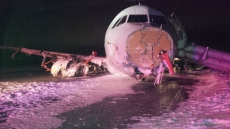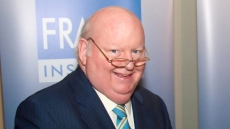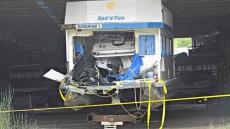Who wouldn’t want better roads, more public transit and improved transportation options? While answering that may be easy, residents of the Lower Mainland are currently being faced with a similar dilemma albeit with complicated consequences, making the answer not as simple as it may seem. The 2015 Metro Vancouver Transportation and Transit Plebiscite landed in mailboxes mid-March and with it came aggressive campaigns in support of and against the Mayors’ Council plan for improving transportation.
The question posed to residents reads “Do you support a new 0.5 per cent Metro Vancouver Congestion Improvement Tax, to be dedicated to the Mayors’ Council transportation and transit plan?” Two answers, Yes or No, are presented, leaving Vancouverites the right to have their voice heard in what has become an argument over increased taxes, supporting TransLink, and the need to keep up with the ever growing area in which we live.

The plan promises to increase service on buses, SkyTrain, Canada Line, SeaBus and West Coast Express; build a new Pattullo Bridge; build rapid transit to connect Surrey Centre with Guildford, Newton and Langley, as well as along Broadway in Vancouver; in addition to maintaining and upgrading major roads, and extending both the cycling and pedestrian walkway networks.
If the question was simply a matter of making improvements, it’d be hard to argue anything but. However, both a Yes or a No vote have their own benefits and consequences, leaving residents to ensure they’ve done their research.
Voting yes would address the growing concern for increasing and improving transportation options around Metro Vancouver. In a statement sent to Darpan, TransLink offered their views on the current state of transit and what the plan, and, consequently, the vote, would mean to them. “TransLink is aware the demands for service in this growing Metro Vancouver region far outstrip our capacity to provide all the required buses and trains people need and expect. Without any new investment or resources in future, we can only continue to provide an existing service level or status quo. That means more overcrowding, particularly on busy bus routes such as the UBC-bound B-line that students depend on.”
Transit may seem like the focus of the vote, but voting yes will also benefit those who drive, cycle and walk. “There’s something in it for everyone,” says Surrey mayor Linda Hepner. The promised thoroughfare upgrades, combined with more buses, improved service across all transit options, and light rail in cities currently without transit, will improve the commute for all drivers by an estimated 20 – 30 minutes.
“A Yes vote is needed to secure regional funding for the Light Rail Transit project,” says Paul Lee, rapid transit and strategic projects manager for the City of Surrey. “A No vote would make it challenging for senior levels of government to commit to funding for these large rapid transit projects in the region.” “This Yes vote will just ensure that those projects can move forward,” says Hepner.
“There simply is not enough funding for the capital infrastructure, and then for the ongoing operational infrastructure that’s required in the absence of this plan. And 45 per cent of the projects in the plan directly benefit Surrey. It’s been 20 years since Surrey has seen any new investments in rapid transit, and look at the growth of the city.”
While it can be said that voting yes will save residents money in the long run as they forgo vehicles in place of reliable public transit, it comes at a cost. The number differs between campaigns, but the 0.5 per cent tax is estimated to cost households between $53 and $238 each year. As promoted by the No TransLink Tax campaign, it is money residents may prefer to spend elsewhere – or not have to spend at all.
“People are stretched thin in this province,” says Jordan Bateman, spokesman for the Canadian Taxpayers Federation and the No TransLink Tax campaign, listing off various taxes which voters are already subjected to. “There’s never a break for anyone in the Lower Mainland. I think the opportunity to vote no to another voluntary tax is very attractive to some people.”
But is it an issue of tax? Or one of trust? The consensus is that TransLink is the problem. Despite support for the Mayors’ Council plan, residents are finding it difficult to support an organization they feel has failed them in the past. While the vote isn’t specifically in support of TransLink, Hepner acknowledges it is perhaps the most challenging aspect of the campaign.
“It’s been very difficult for us to have people understand that this is the Mayors’ Transportation Plan,” says Hepner. “It all comes back to TransLink, and TransLink has got – and they know they’ve got – a branding and operational problem that they’re working on.”
“TransLink has wasted too much of our taxpayer money to be trusted with any more of it,” says Bateman, reiterating that the problem with the plan is the organization it supports. “I’m not anti-transit. There are thousands of people voting no who are very much in favour of more transit. The problem we have is that TransLink is the agency that’s delivering it. They haven’t done a very good job, and so it’s hard to trust them.”
Difficult as it may be to separate the two, a Yes vote is not a vote for TransLink. The funds generated from the tax increase will be allocated to specific projects as outlined in the Mayors’ Council plan. TransLink won’t simply receive the income generated – it must be used for the voted-on improvements. “The difficulty remains that there is little time to mount a proper campaign to explain the Mayors’ Council’s vision to the public,” Lee says. “However, on the whole, Surrey residents are aware of the needs on the Pattullo Bridge and better transit throughout the city.”
In speaking with Surrey residents, improved transportation is certainly a concern; however, many have voiced they don’t want it enough to put their trust in TransLink. Tri-Cities resident Emily Novitski supports the plan and hopes others see the value in it, as well. “We cannot afford to wait until TransLink becomes efficient to properly maintain our transit system. We could be waiting forever. We need repairs now.”
Novitski has to drive into Surrey on a regular basis, and is concerned every time she does so. “The city is growing, and our transit needs to be accommodating. Our bridges and roads need maintenance or our lives are at risk. What happens to the Pattullo [Bridge] if this doesn’t pass?” she says, referencing the I-5 Skagit River Bridge in Washington, which was built 18 years after the Pattullo Bridge but recently collapsed.
“Please do not punish commuters, the environment and the economy because of TransLink,” Novitski pleads. Because this vote is not a referendum but instead a plebiscite, it’s not binding. Fortunately, for those in support of the plan, this means that despite the results, the vision for improved transportation around Metro Vancouver is likely to become a reality either way, just with a slower timeline and possibly at the expense of the other taxes.
“If it’s a Yes vote, we’ll immediately get started on some of the easier things to do,” Hepner explains, “which would be service improvements, ordering of buses; and certainly we’ll be moving forward with our rail application. We’ve already passed the first hurdle of rail with the funding through the federal government, so we’ll be fast tracking that.”
“If it’s a No vote, I guess we’ll have to figure out how, within the existing system, we can...,” Hepner stops, slightly stumped, thinking about the future of the city without a Yes vote. “The capital infrastructure projects will be delayed, and frankly, [Surrey] will be facing the gridlock that nobody wants to see.”
With votes due at the end of May, both sides have been encouraging residents to have their voice heard. Whether transit is a priority or TransLink is the enemy, whether you drive, bike, walk or bus, the government is asking for the opinion of residents, and only time will tell who is speaking the loudest.







